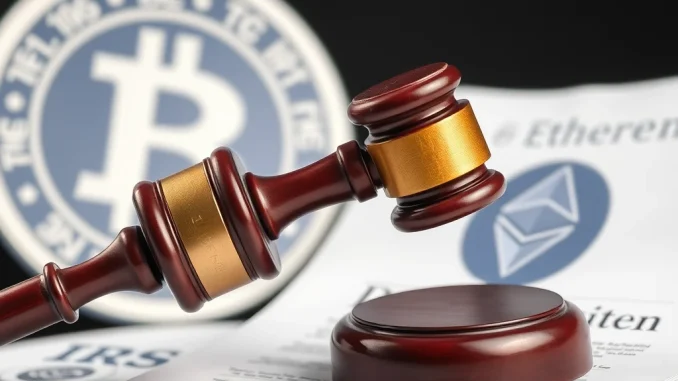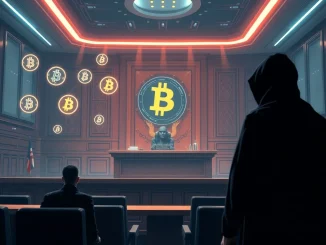
Exciting news for the crypto world! Hold onto your digital hats because a potential groundbreaking shift in U.S. crypto regulation is on the horizon. Sources close to Crypto In America’s Eleanor Terrett are reporting that former President Donald Trump is anticipated to imminently sign a joint congressional resolution. This resolution is no ordinary piece of paper; it aims to overturn the controversial IRS DeFi broker rule that has been causing ripples of concern throughout the decentralized finance (DeFi) space.
What’s the Buzz About the IRS DeFi Broker Rule?
Let’s break down what this IRS DeFi broker rule is all about and why overturning it is such a big deal. In essence, the rule, as currently interpreted, could classify certain DeFi protocols and participants as ‘brokers’ for tax purposes. This classification would impose significant and arguably impractical tax reporting burdens on these entities. Imagine decentralized exchanges (DEXs), lending platforms, and even individual users suddenly having to comply with complex broker reporting requirements – it’s a regulatory headache, to say the least!
Here’s why this rule has sparked so much debate and concern within the crypto community:
- Compliance Nightmare: DeFi protocols are designed to be decentralized and often operate without central intermediaries. Forcing them into a traditional ‘broker’ mold simply doesn’t fit and creates immense compliance challenges.
- Innovation Stifler: The onerous reporting requirements could stifle innovation in the rapidly evolving DeFi sector. Projects might hesitate to launch or expand in the U.S. if faced with such regulatory hurdles.
- Privacy Concerns: The rule raises privacy concerns as it could necessitate the collection and reporting of user data in a space that often prioritizes pseudonymity and decentralization.
Senator Ted Cruz Stepping Up for DeFi
Enter Senator Ted Cruz, a vocal proponent of cryptocurrency and blockchain technology. Senator Cruz took the initiative and introduced a joint resolution specifically targeting this IRS DeFi broker rule. His resolution argues that decentralized finance protocols should be exempt from these broker tax reporting requirements, recognizing the unique nature of DeFi and its divergence from traditional financial intermediaries.
The resolution swiftly gained traction and impressively passed the Senate with broad bipartisan support. This level of consensus in the often-divided political landscape underscores the growing recognition of the importance of clear and sensible crypto regulations. It signals a potential shift towards a more understanding and supportive stance towards the digital asset industry within U.S. policymaking circles.
Trump’s Signature: A Game Changer for Crypto Tax?
Now, all eyes are on former President Trump. If, as expected, he signs this joint resolution, it will mark a pivotal moment. Not only would it overturn the contentious IRS DeFi broker rule, but it would also be the very first piece of crypto-related legislation signed into law by a U.S. President. This is a symbolic victory for the crypto industry and a tangible step towards establishing a more favorable regulatory environment.
Senator Cruz himself is reportedly expected to be present at the signing ceremony, further emphasizing the significance of this event. It’s a powerful visual – a key political figure championing crypto alongside a former president enacting legislation that directly impacts the digital asset space.
What Does Overturning the IRS Rule Mean for You?
So, what are the potential implications of this Trump-signed bill for the average crypto user and the wider industry?
- Reduced Regulatory Uncertainty: Overturning the rule would immediately alleviate a significant layer of regulatory uncertainty hanging over the DeFi sector. This clarity can foster growth and encourage further development.
- Boost for DeFi Innovation: With reduced compliance burdens, DeFi projects can breathe easier and focus on innovation, potentially leading to exciting new applications and services within the ecosystem.
- Validation of Crypto: Presidential endorsement of crypto-related legislation, even if it’s overturning a rule, sends a strong message of validation to the industry. It signals that policymakers are paying attention and are willing to engage with the nuances of this emerging technology.
- Potential for Further Pro-Crypto Legislation: This could be the first domino to fall. A successful overturning of the IRS rule might pave the way for more comprehensive and pro-crypto legislation in the future, addressing other areas of regulatory ambiguity.
Challenges and the Road Ahead for Crypto Regulation
While this expected signing is undoubtedly a positive development, it’s important to acknowledge that the journey towards clear and comprehensive crypto tax regulations is far from over. The crypto space is constantly evolving, and regulators face the ongoing challenge of keeping pace with technological advancements while ensuring investor protection and tax compliance.
Here are some ongoing challenges and areas to watch:
- Defining ‘Broker’ in the Digital Age: The fundamental question of what constitutes a ‘broker’ in the context of decentralized and disintermediated technologies remains a complex one. Ongoing dialogue and nuanced regulatory frameworks are needed.
- Global Regulatory Harmonization: Crypto is a global phenomenon. Lack of harmonization across jurisdictions can create confusion and hinder cross-border innovation. International cooperation on crypto regulations is crucial.
- Balancing Innovation and Regulation: Striking the right balance between fostering innovation and implementing necessary regulations is an ongoing tightrope walk for policymakers worldwide. Overly restrictive regulations can stifle growth, while insufficient oversight can create risks.
Conclusion: A Beacon of Hope for DeFi and Crypto
The expected signing of the bill overturning the IRS DeFi broker rule is a significant and welcome development for the cryptocurrency industry. It represents a potential victory against overly broad regulatory interpretations and a step towards a more sensible and innovation-friendly approach to crypto regulation in the United States. While challenges remain, this event serves as a beacon of hope, signaling that policymakers are beginning to understand the unique characteristics of decentralized finance and the potential of the broader crypto ecosystem. Keep your eyes peeled for the official signing – it could be a truly transformative moment for the future of crypto in America!



